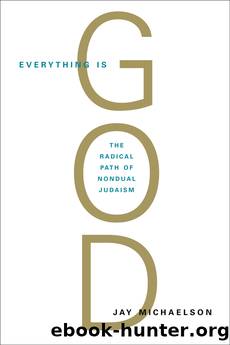Everything Is God by Jay Michaelson

Author:Jay Michaelson
Language: eng
Format: epub
Publisher: Shambhala
Part Two
ARETZ: PRACTICE
6
MIND: SEEKING AND STOPPING SEEKING
Religious truths need verification by everyone. To see God is the one goal.
—VIVEKANANDA1
I came to realize clearly that mind is no other than mountains, rivers, and the great wide earth, the sun and the moon and the stars.
—DOGEN2
When one contemplates things, everything is revealed as one.
—ZOHAR3
The essential facts of nonduality, and of the nondual Jewish God, Torah, and Israel, are, in a sense, the map. The coming chapters are the territory.
It is difficult to write about spiritual practice without sounding like the author of a cookbook, but there is no alternative; a religion of dogmas may be fulfilled entirely secondhand, but mysticism requires the experiential. “Without feeling, the thought of unity is just imagination,” says R. Aharon of Staroselye.4 Imagine, to suggest a different metaphor, if one only viewed maps of the world, and never left home; such would be the incompleteness of nishmah, “we will understand” without na’aseh, “we will do.” Indeed, as the verse from Exodus suggests, experience may generate theology, rather than flow from it; Scholem called Hasidic panentheism “not the product of some theory or other, not even of a Kabbalistic doctrine, but of direct, spontaneous religious experience.”5
As we turn, then, to practice, it is worth remembering a certain paradoxical aspect of nondual spirituality. There is great truth to the maxim that the only thing preventing enlightenment is searching for it. If it is the case that all is one, or in Jewish language that all is God, then surely the only “obstacle” to realization is the erroneous belief that it’s not already here, now. It’s not that we aren’t enlightened; it’s that we think we aren’t. Really, since God is reading these words right now, enlightenment is more about losing knowledge—specifically, that of self and other, and of the “God” out there in the world—than gaining it. For this reason, many nondualists, especially in the contemporary period, shy away from any notion of spiritual practice or progress.6 The very notion implies a fallacy: that at some later date, under the right circumstances, you’ll be more a part of the Infinite than you are right now. For these teachers, surrender is the only true practice. This is it, and that is that.
R. Aharon of Staroselye, like most Jewish nondualists, has a different view. Yes, from God’s point of view, everything is God, the world doesn’t truly exist, and there is nothing wrong with anything, including our own limited and confused points of view. But from those limited points of view, a great deal seems to be wrong. We suffer, we cause harm to others, and our hearts are subject to the vicissitudes of life as a human being. Of course, we also rejoice, and love, and build; it’s not that human life is purely suffering. (Even the Buddha never said that; he said only that suffering exists, not that life “is” suffering.) But, no matter how often some nondualists repeat the assertion that there is nowhere to go and nothing
Download
This site does not store any files on its server. We only index and link to content provided by other sites. Please contact the content providers to delete copyright contents if any and email us, we'll remove relevant links or contents immediately.
| Hebrew Bible (Old Testament) | Talmud |
| Torah | Zohar |
The Power of Habit by Charles Duhigg(3130)
Man's Search for Meaning by Viktor E. Frankl(2670)
Mckeown, Greg - Essentialism: The Disciplined Pursuit of Less by Mckeown Greg(2440)
MOSES THE EGYPTIAN by Jan Assmann(2412)
Devil, The by Almond Philip C(2326)
The Complete Dead Sea Scrolls in English (7th Edition) (Penguin Classics) by Geza Vermes(2277)
Unbound by Arlene Stein(2268)
I Capture the Castle by Dodie Smith(2034)
Schindler's Ark by Thomas Keneally(1879)
The Invisible Wall by Harry Bernstein(1799)
The Gnostic Gospel of St. Thomas by Tau Malachi(1794)
The Bible Doesn't Say That by Dr. Joel M. Hoffman(1677)
The Secret Doctrine of the Kabbalah by Leonora Leet(1607)
Political Theology by Carl Schmitt(1579)
The Jewish State by Theodor Herzl(1533)
A History of the Jews by Max I. Dimont(1529)
The Dead Sea Scrolls Bible by Martin G. Abegg(1513)
The Book of Separation by Tova Mirvis(1486)
Oy!: The Ultimate Book of Jewish Jokes by David Minkoff(1369)
